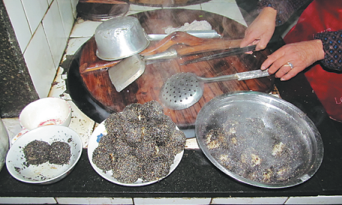Oh, maqiu: Mistaking a winter solstice treat for tangyuan

All those years, I had it all wrong about maqiu, a traditional winter solstice food for my husband Jun's family in rural Zhejiang province.
Whenever Jun mentioned the sesame balls he had eaten for the holiday while growing up, I had always imagined a version of tangyuan, those delicious glutinous rice balls stuffed with sweet sesame or red bean paste typically enjoyed in southern China. Except, he called them sesame balls or maqiu, not tangyuan. So I thought, maybe maqiu was just another name for tangyuan in the local dialect?
But then years ago, one night before winter solstice with Jun's family, I watched my mother-in-law prepare maqiu in her kitchen and did a double take. She dropped inch-sized balls of glutinous rice dough, made from glutinous rice flour and cold water, straight into a wok of boiling water without tucking anything inside. Had she lost her mind? Where was the muss and fuss of filling the dough with sesame paste that I'd had to slog through all those years before, when Jun and I used to live in the United States?
Once the rice balls floated to the top, which took only a few minutes, she fished them out of the boiling water and then rolled them in a sweet mixture of toasted black sesame seeds and white sugar that coated every inch of the dough. That's when I realized it-it was my mistake, not hers.
"Here, eat them while they're hot," my mother-in-law said as she pressed a steaming bowl of them into my hands.
"But that's it?" I replied, my face almost flushed with embarrassment. Could she tell that I had confused maqiu with tangyuan all along?
"Eh, it's simpler! You don't need to worry about all that trouble of filling them."
Oh, I knew all about that trouble. All those years in the US, I had slaved hours upon hours to make so-called maqiu-never realizing the actual recipe could be so quick and easy.
Sometimes, family traditions get lost in translation when you've never experienced them. Previously, I had only learned about maqiu through long-distance phone conversations with Jun's family over the years and through my husband (who had clearly omitted a few critical details in his descriptions of the cherished holiday dish).
But aren't you bound to misunderstand when you learn something secondhand? During our huge winter solstice dinner that year, I tried sharing some of the foods we used to eat for Christmas-cranberry sauce, turkey and mashed sweet potatoes. How do you describe "cranberry sauce" to people when they've never even seen the actual berries at the heart of this sweet-and-tart holiday delight? How can you explain the aroma of a turkey fresh from the oven when they've never tasted turkey and don't have an oven? Even though people grow sweet potatoes in the village, including Jun's family, chances are they've never tried anything like my creamy, buttery sweet potato and parsnip mash. I wonder what went through their minds when I chronicled Christmas dinners of the past?
Well, you live and learn-especially when you've had the opportunity to live with family. And what I learned brought me enormous holiday relief. Never again would I have to fiddle around with filling balls of rice dough in the name of tradition.



Today's Top News
- Another sign of Japan's right-wingers' dangerous ambition to break free of all postwar constraints
- Hainan's special customs operations start strong
- Macao SAR holds flag-raising, reception to mark 26th anniversary of return to motherland
- China issues rules to regulate pricing practices of internet platforms
- US hits over 70 IS-linked targets in Syria in massive retaliatory strikes
- Coffee needs cooperation, not confrontation






























